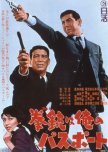"Morals or money?"
If you ever wondered what would happen if you combined a yakuza film, a noir, and a spaghetti western, here’s the answer---A Colt Is My Passport. Murder, betrayal, and of course there was a dame involved. Pop the popcorn and kick up your feet for Nomura Takashi’s black and white crime flick.
Kamimura and his driver, Shun, have been hired to take out the head of a yakuza family. After successfully completing his mission, the families decide it would be more financially beneficial to work together which means Kamimura and Shun have to be eliminated. The two fugitives hole up in a rundown hotel for truckers and make the acquaintance of Mina, an ex-yakuza moll. The port is crawling with gangsters searching for the partners which makes staying alive, much less escaping nearly impossible.
This was my first Shishido Jo film and I actually paused the film to see if he had been recovering from the mumps while filming this movie as his cheeks looked unnaturally swollen. Turns out he wanted to look different and had the work done. So, if he was happy with them, it wasn’t my business, though they could be distracting to look at initially.
Acts 1 and 3 were gripping. At the beginning Kamimura methodically worked his murderous magic, even taking time to listen to a bird sing. At the slam bang finish he once again contemplated perhaps the last moments of his life by watching a fly crawl around. The slow middle act lacked the intensity and compelling moments the other two contained.
“All that’s left for me is dust and the smell of men and gasoline.” Mina seemed to be there to witness Kamimura and Shun’s loyalty to each other, as well as to fall in love with Kamimura. Sadly, she jealously wished women could have the kind of friendships men had, giving false credence to the old myth that women’s friendships are shallow. Be that as it may, Kamimura and Shun were devoted to each other with the hitman working overtime to protect his friend, even tucking him at night.
With music reminiscent of Ennio Morricone’s, a dusty landfill standing in for the dust blown desert towns, and a man in black staring down a killer with guns blazing, the spaghetti western influence was obvious. Being obvious didn’t mean that it didn’t work, there were many powerful and captivating images. If you enjoy old Japanese crime films, this is one to try.
4 January 2025
Kamimura and his driver, Shun, have been hired to take out the head of a yakuza family. After successfully completing his mission, the families decide it would be more financially beneficial to work together which means Kamimura and Shun have to be eliminated. The two fugitives hole up in a rundown hotel for truckers and make the acquaintance of Mina, an ex-yakuza moll. The port is crawling with gangsters searching for the partners which makes staying alive, much less escaping nearly impossible.
This was my first Shishido Jo film and I actually paused the film to see if he had been recovering from the mumps while filming this movie as his cheeks looked unnaturally swollen. Turns out he wanted to look different and had the work done. So, if he was happy with them, it wasn’t my business, though they could be distracting to look at initially.
Acts 1 and 3 were gripping. At the beginning Kamimura methodically worked his murderous magic, even taking time to listen to a bird sing. At the slam bang finish he once again contemplated perhaps the last moments of his life by watching a fly crawl around. The slow middle act lacked the intensity and compelling moments the other two contained.
“All that’s left for me is dust and the smell of men and gasoline.” Mina seemed to be there to witness Kamimura and Shun’s loyalty to each other, as well as to fall in love with Kamimura. Sadly, she jealously wished women could have the kind of friendships men had, giving false credence to the old myth that women’s friendships are shallow. Be that as it may, Kamimura and Shun were devoted to each other with the hitman working overtime to protect his friend, even tucking him at night.
With music reminiscent of Ennio Morricone’s, a dusty landfill standing in for the dust blown desert towns, and a man in black staring down a killer with guns blazing, the spaghetti western influence was obvious. Being obvious didn’t mean that it didn’t work, there were many powerful and captivating images. If you enjoy old Japanese crime films, this is one to try.
4 January 2025
Esta resenha foi útil para você?

 55
55 217
217 11
11























